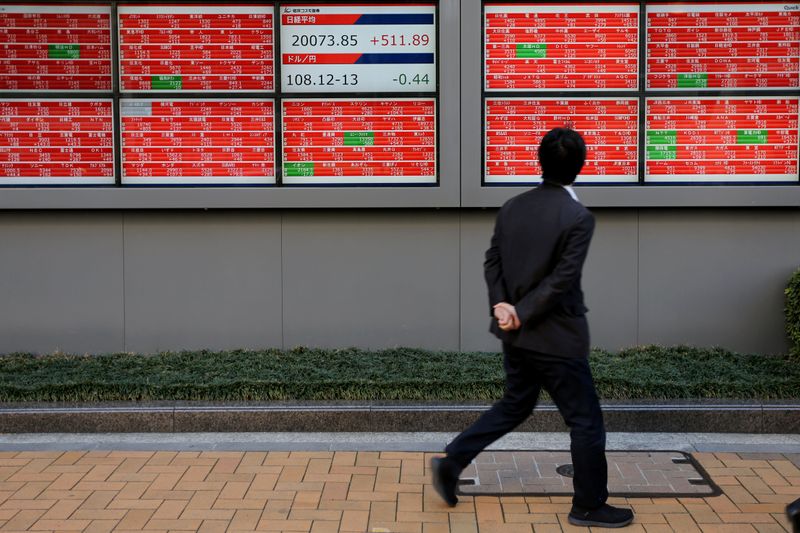This post was originally published on this site
https://i-invdn-com.akamaized.net/trkd-images/LYNXMPEFBH00I_L.jpg © Reuters. A man looks at an electronic board showing the Nikkei stock index outside a brokerage in Tokyo
© Reuters. A man looks at an electronic board showing the Nikkei stock index outside a brokerage in TokyoBy Wayne Cole
SYDNEY (Reuters) – Asian stocks took a breather at 18-month peaks on Wednesday having climbed for five straight sessions, while the British pound was licking its wounds as revived Brexit fears came back to bite it.
MSCI’s broadest index of Asia-Pacific shares outside Japan () was dead flat in thin early trade, just off its highest since June last year.
Japan’s Nikkei () dipped 0.1% and away from its 2019 top, while Korean shares () edged up 0.1% to an eight-month peak. E-Mini futures for the S&P 500 () were little changed.
Upbeat economic news had helped the S&P 500 reach a record for the fourth straight session, building on its 27% gain this year. The Dow () ended Tuesday up 0.19%, while the S&P 500 () gained 0.07% and the Nasdaq () 0.11%.
U.S. housing starts were surprisingly strong in November, and building permits rose to the highest level since May 2007. Manufacturing output picked up more than expected as a strike at General Motors Co (N:) ended.
A run of better data recently has helped calm fears of recession while the phase one Sino-U.S. deal on trade seems to have lifted some of the uncertainty on the global outlook.
The sea change was clear in BofA Global Research’s latest survey of fund managers with recession concerns diving 33 percentage points to a net 68% of investors saying a recession is now unlikely in 2020.
Global growth expectations jumped 22 percentage points, marking the biggest 2-month rise on record. As a result, funds’ allocation to global equities climbed 10 percentage points to a net 31% overweight, the highest level in a year.
THEN AGAIN…
Yet it might be too soon to declare an all-clear on the political front with UK Prime Minister Boris Johnson upsetting markets by taking a hard line on Brexit talks.
Johnson will use the prospect of a Brexit cliff-edge at the end of 2020 to demand the EU give him a comprehensive free trade deal in less than 11 months.
The threat of a hard exit sent shivers through sterling, which slid 1.5% in its largest one-day fall this year.
The pound was last at $1.3110 having shed all the gains made on Thursday and Friday after it became clear that the Conservative Party was heading for a big win. [GBP/]
“We treat the risk of a hard Brexit as a ‘tail risk’ at this stage,” said Joseph Capurso, a senior currency strategist at CBA. “A UK‑EU trade deal by end 2020, while difficult, is still possible.”
“In our view will remain supported at around $1.3000‑$1.3100 and upside contained near $1.3500 over the next several months.”
Sterling’s slide gave the a lift to 97.184 () against a basket of currencies, extending a bounce from last week’s five-month low of 96.588.
The euro also surged on the pound () and was steady on the dollar at $1.1150 (). The yen was little changed at 109.52 per dollar .
was idling at $1,475.90 per ounce , after a couple of very quiet sessions.
Oil prices eased from three-month highs as data showed U.S. crude stocks rose unexpectedly in the most recent week.
U.S. crude () fell 37 cents to $60.57 a barrel, while Brent crude () futures had yet to trade.
Fusion Media or anyone involved with Fusion Media will not accept any liability for loss or damage as a result of reliance on the information including data, quotes, charts and buy/sell signals contained within this website. Please be fully informed regarding the risks and costs associated with trading the financial markets, it is one of the riskiest investment forms possible.

